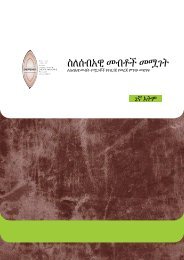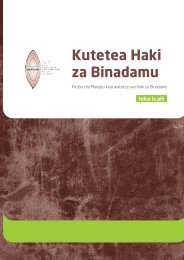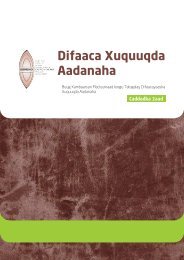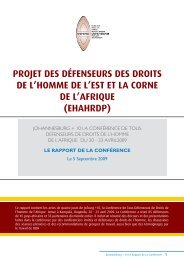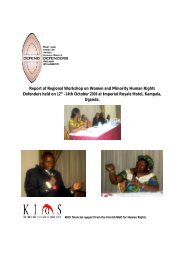English PDF - East and Horn of Africa Human Rights Defenders ...
English PDF - East and Horn of Africa Human Rights Defenders ...
English PDF - East and Horn of Africa Human Rights Defenders ...
Create successful ePaper yourself
Turn your PDF publications into a flip-book with our unique Google optimized e-Paper software.
Conference Report: Resources <strong>and</strong> Proceedings 15Laws <strong>and</strong> regulations affecting the media in EthiopiaThere has been no formal legislation particularly regulating the media, <strong>and</strong> as such, prosecutionshave been based on the civil code. However, a new draft press law has been prepared by theGovernment <strong>and</strong> revised by expatriate media pr<strong>of</strong>essionals pending endorsement by Parliament inthe next few months. There was a press law that was enacted during the period <strong>of</strong> the transitionalGovernment. This law although it has some deficiency, was a much better law than the oneproposed as the new draft law. The new draft law is largely criticized among members <strong>of</strong> themedia for being a legal ground for the Government to exercise full control over the flow <strong>of</strong>information either to cripple media capacity to produce investigative stories or act as a watchdogto the use <strong>and</strong> abuse <strong>of</strong> power.Critics hold that the press law enacted during the period <strong>of</strong> transitional Government was closer tointernational st<strong>and</strong>ards <strong>of</strong> media freedom despite some deficiencies. Some even question thenecessity <strong>of</strong> having a separate press law to regulate media activity saying that a journalist shall betreated no differently than any other citizen <strong>and</strong> shall be prosecuted by the same laws that applyto other citizens. The draft press law stipulates that journalists violating the abiding terms setforth could face prison terms <strong>and</strong> fines based on the simplicity <strong>and</strong> complexity <strong>of</strong> the felony,according to the draft. Critics have also argued that a number <strong>of</strong> the stated felonies threaten thevery rights <strong>of</strong> Ethiopians to express their views <strong>and</strong> access to accurate information protected bythe Constitution.Abuse <strong>of</strong> the media <strong>and</strong> journalistsMedia <strong>and</strong> journalist abuse is portrayed by the cascade <strong>of</strong> fear among the publishing communityto express strong political dialogue that is critical <strong>of</strong> the existing policies <strong>and</strong> strategies. Manyjournalists now complain <strong>of</strong> self censorship, <strong>and</strong> the complaint has not been limited to the mediaoutlets, but has echoed further to the public at large. Many people have become increasinglyunwilling to comment on political issues <strong>and</strong> be quoted on anything that risks a chance <strong>of</strong> runninga possible interpretation <strong>of</strong> political repercussion. This has especially made the task <strong>of</strong> politicaljournalists extremely difficult.Personal experience <strong>and</strong> experiences <strong>of</strong> other journalistsMy journalistic experience has been relatively smooth in terms <strong>of</strong> incidents <strong>of</strong> harassment by theGovernment, compared to incidents <strong>of</strong> other colleagues who have passed through harshercircumstances while reporting clashes <strong>and</strong> other political activities. The most challengingproblem I faced took place during the October violence while I was assigned to do stories onfamilies <strong>of</strong> the victims <strong>of</strong> the deadly clash. And I encountered immense difficulties to completethe stories <strong>and</strong> publish them. A number <strong>of</strong> stories were delayed for lack <strong>of</strong> willing people whosevoices would complement the stories or discarded for last minute refusal <strong>of</strong> interviewees to havetheir word published on a newspaper. The refusals usually came following consultation withfamily members <strong>and</strong> friends who have advised them not to comment on anything for journalists.A noticeable challenge happened as I was assigned to cover a story on the families <strong>of</strong> those killedin the unrest in Addis Ababa. Friends <strong>and</strong> family members <strong>of</strong> a teenager victim whose words Itook had later refused to have their stores published for fear <strong>of</strong> persecution. Some have said thatthey have received warning signals from local authorities <strong>and</strong> security personnel not to divulgedetails about the situation <strong>and</strong> their discomfort.



